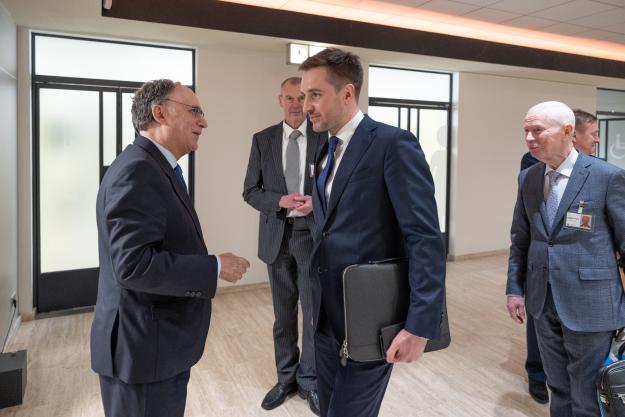
Ambassador Fernando Arias, Director-General of the OPCW, meets with Mr Kirill Lysogorsky, Deputy Minister of Industry and Trade of the Russian Federation, and their respective delegations.
THE HAGUE, Netherlands—27 November 2023—The Director-General of the Organisation for the Prohibition of Chemical Weapons (OPCW), Ambassador Fernando Arias, had a meeting with the Deputy Minister of Industry and Trade of the Russian Federation, H.E. Mr Kirill Lysogorsky, on the sidelines of the Twenty-Eighth Session of the Conference of the States Parties to the Chemical Weapons Convention (CSP-28) in The Hague, Netherlands.
During the bilateral meeting, the Director-General and the Deputy Minister discussed a wide range of issues related to the implementation of the Chemical Weapons Convention. They discussed the degraded international environment and the necessity to address the threat of chemical weapons use to advance peace and international security. The Director-General highlighted that the OPCW Centre for Chemistry and Technology (ChemTech Centre) has significantly enhanced the Organisation’s capacity to strengthen chemical safety and security in Member States. He also underlined that monitoring rapid advancements in science and technology is an important factor for the Organisation’s work in preventing chemical weapons re-emergence.
“The ChemTech Centre is an essential tool for the OPCW to address both risks and opportunities, related to the implementation of the Convention, arising from the rapid progress in science and technology,” said the Director-General. “Following the end of destruction of all declared chemical weapons stockpiles earlier this year, preventing the re-emergence of these horrific weapons of mass destruction remains a top priority for the Organisation and a critical element of our mission to achieve a world where chemistry is used only for peaceful purposes.”
Both the Director-General and the Deputy Minister reiterated the importance of Russia’s active participation in the effective implementation of the Convention.
The Deputy Minister stated: “The Russian Federation is determined to continue playing a significant role in the activities of the OPCW to achieve the main goal of the CWC – the world free of chemical weapons, including non-resumption of its production and use. Russia would like to believe that the Technical Secretariat will response to chemical provocations in an appropriate manner, in accordance with its mandate based on impartiality, objectivity and due professionalism. In this context Russia supports the intention of the Director-General to continue cooperation with the representatives of the Syrian Arab Republic to maintain an expert dialogue on relevant issues, in particular to hold consultations with the Minister of Foreign Affairs of Syria, H.E. Mr F. Mekdad.”
Background
The Russian Federation has been an active member of the OPCW since the Chemical Weapons Convention entered into force in 1997.
The Declaration Assessment Team was established in 2014 to engage the relevant Syrian authorities to resolve the identified gaps, inconsistencies, and discrepancies in the Syrian declaration. The Fact-Finding Mission was set up in the same year in response to persistent allegations of chemical weapon attacks in Syria, with the task to establish facts surrounding allegations of the use of toxic chemicals for hostile purposes. The Investigation and Identification Team began its work in 2019 and is responsible for identifying the perpetrators of the use of chemical weapons in Syria.
As the implementing body for the Chemical Weapons Convention, the OPCW, with its 193 Member States, oversees the global endeavour to permanently eliminate chemical weapons. Since the Convention’s entry into force in 1997, it is the most successful disarmament treaty eliminating an entire class of weapons of mass destruction.
On 7 July 2023, the OPCW verified that all chemical weapons stockpiles declared by the 193 States Parties to the Chemical Weapons Convention since 1997 — totalling 72,304 metric tonnes of chemical agents — have been irreversibly destroyed under the OPCW’s strict verification regime.
For its extensive efforts in eliminating chemical weapons, the OPCW received the 2013 Nobel Peace Prize.
